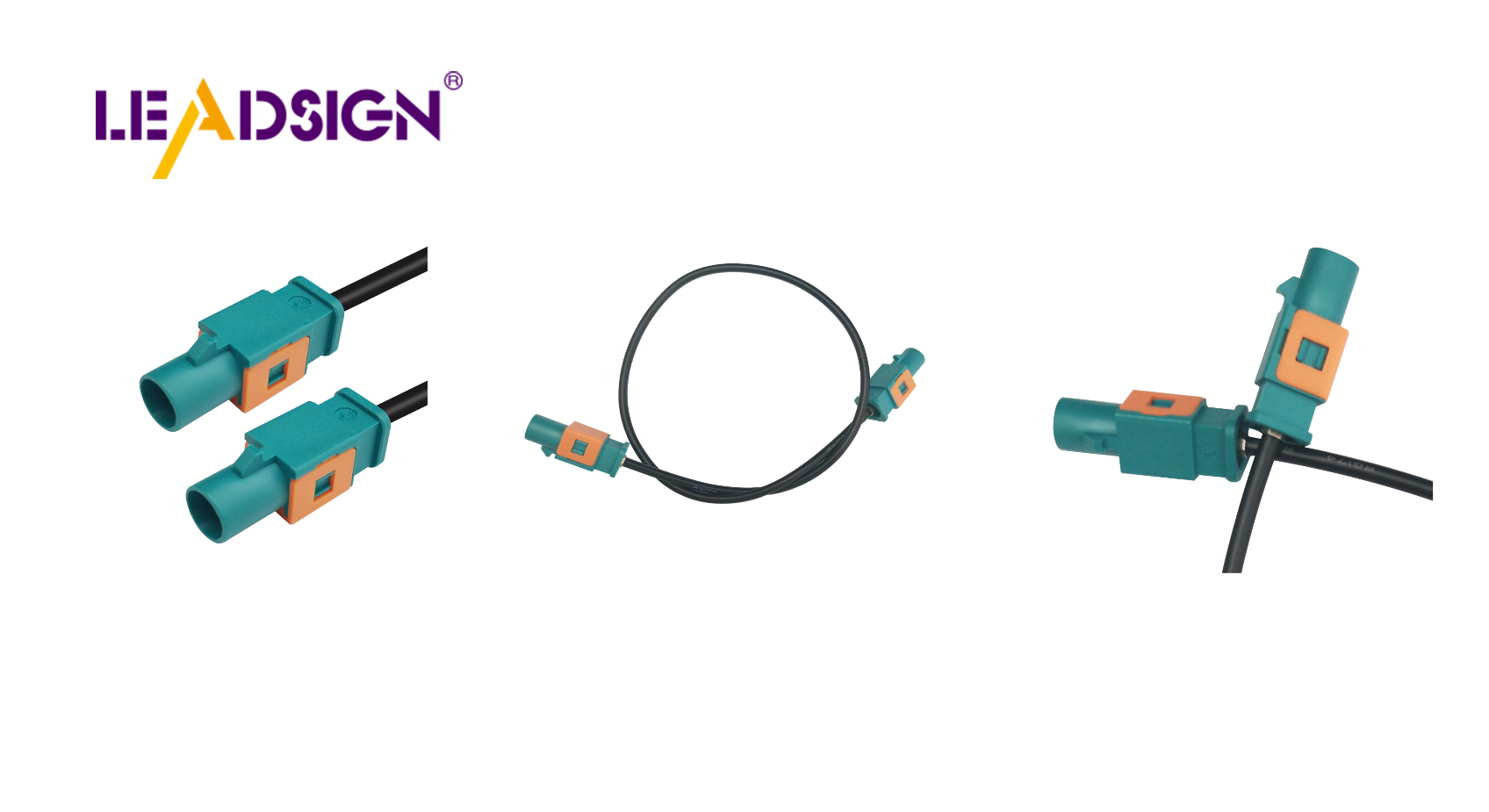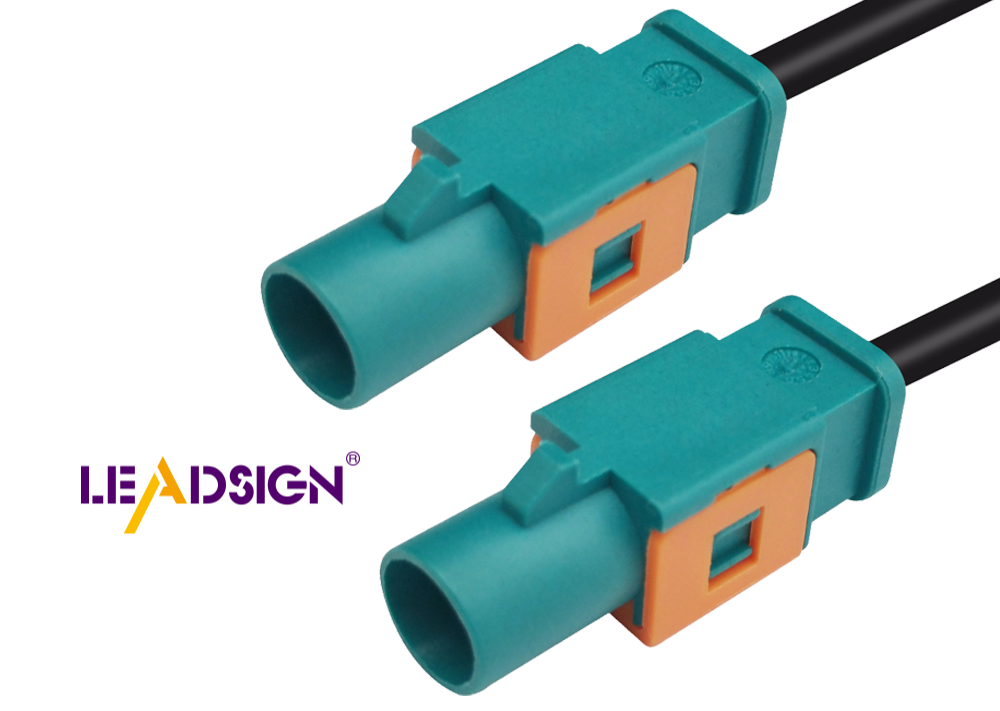A Deep Dive into Auto Electrical Connectors Plugs

Vehicle connectors are very important for your car's electrical system. These small parts link electrical circuits, ensuring that power and signals move smoothly through the vehicle. New cars need these connectors to work well with complex electronics, providing safe and reliable connections. This helps your car run efficiently and dependably. As more people seek electric and hybrid cars, selecting the right vehicle connectors becomes even more crucial.
Key Takeaways
Understand the different types of vehicle connectors, such as blade, ring, spade, bullet, butt, and FAKRA connectors, to choose the right one for your car's electrical needs.
Learn proper installation methods like crimping and soldering to ensure strong and reliable connections in your vehicle's wiring.
Select connectors based on their material properties; copper is excellent for conductivity, while insulation materials like plastic and rubber protect against environmental factors.
Evaluate your car's electrical requirements and match connectors accordingly to prevent overheating and ensure optimal performance.
Balance cost and quality when purchasing connectors; investing in high-quality options can save you money on repairs in the long run.
Regularly check and maintain your vehicle's connections to prevent issues and ensure the electrical system operates safely and efficiently.
Types of Vehicle Connectors

Knowing about vehicle connectors is important for car repair. These parts help electrical signals and power move in your car. Let's look at some common connectors used in cars.
Blade Connectors
Blade connectors are very common in cars. They have a flat metal piece that fits into a slot. This makes a strong connection. You see them in fuse boxes and other parts needing a good link. Blade connectors are simple to use and hold well, so they are popular in cars.
Ring and Spade Terminals
Ring and spade terminals are also common. They attach to screws or bolts for a strong hold. Ring terminals are circles, while spade ones have an open end. This makes them easy to put on and take off. They are used where a strong link is needed, like with battery wires.
Bullet Connectors
Bullet connectors are round and fit into each other tightly. They are used in car wiring where space is small. Bullet connectors are easy to connect and take apart. This makes them good for places needing regular checks or changes.
By knowing these connectors, you can choose the right one for your car's electrical work. Each type has its own good points and uses, helping your car's parts work well.
Butt Connectors
Butt connectors are important for car wiring. They connect two wires end-to-end, letting electricity flow smoothly. You use them to make wires longer or fix broken ones. There are different types, like insulated and non-insulated. Insulated ones keep out water and dirt, which is great for cars.
To use a butt connector, first strip the wire ends. Put them in the connector and crimp it tight. This makes a strong connection. Butt connectors are handy in small spaces where others won't fit. They are simple and work well, so they are common in cars.
FAKRA Connectors
FAKRA connectors are special for car systems needing high signals. You find them in GPS, radios, and infotainment systems. They are made to be strong and last long in cars.
FAKRA connectors have a coding system to stop mistakes. They lock in place securely. With many housing choices, they save space and are easy to plug in. They come in different types, like cable and panel connectors.
FAKRA connectors are tough for hard car conditions. They handle heat changes and stress well. Using FAKRA connectors makes your car's electrical parts more reliable.
Ways to Install Wire Connectors
When fixing car wires, knowing how to install wire connectors is key. Doing it right makes sure your car's electrical system works well and safely. Let's look at some common ways to put these connectors on.
Crimping Methods
Crimping is a common way to attach wire connectors. You use a crimping tool to squeeze the connector onto the wire. This makes a strong bond. First, take off the wire's cover. Put the wire into the crimp-on connector so it fits tight. Use the crimping tool to press down hard. This method is used for crimp-on wire connectors like butt connectors. Crimping makes a tough link that handles shakes and weather, perfect for cars.
Soldering Methods
Soldering is another way to attach wire connectors. It melts solder around the wire and connector to make a solid link. Start by taking off the wire's cover and putting it in the connector. Heat the spot with a soldering iron and add solder until it covers well. Soldering makes a lasting and good link, keeping electrical connections safe. It needs more skill and tools than crimping but is great for strong and long-lasting connections.
Keeping Connections Safe
Keeping connections safe is important for your car's electrical system. Whether you crimp or solder, always check your work. Pull the wires gently to see if they are tight. Look at the connectors for damage or rust. Using good wire connectors and doing it right helps keep your car's electrical system strong. By doing this, you make sure your car runs well and safely.
Material Choices for Car Connectors
When picking car connectors, think about what they're made of. Good materials make them last long and work well in cars. Let's look at important material choices.
Types of Metal
The metal in connectors is very important. Copper is often used because it lets electricity flow well. This means less energy is lost. But copper can rust. To stop this, makers cover it with tin or nickel to protect it.
Aluminum is another metal used. It's light and cheap, good for some uses. But it doesn't carry electricity as well as copper. Aluminum connectors are used where weight matters more than power flow.
Insulation Materials
Insulation keeps connector parts safe from water and dirt. It also stops short circuits by keeping wires apart. Common insulators are plastic and rubber.
Plastic is light and handles many chemicals. It's strong and bends well. Rubber is great against heat and wear. It's best for connectors near the engine.
Think about where connectors will be used. Engine connectors need heat-proof insulation. Inside the car, flexibility and easy fitting are key.
By knowing connector materials, you can choose better for your car. Pick metals and insulators that fit your needs for strong and lasting connections.
Picking the Right Electrical Connector
Choosing the right connector is key for your car's electrical system. A good choice makes it work well, but a bad one causes problems. Here's how to decide smartly.
Checking Electrical Needs
First, know what your car needs electrically. Different parts need different power levels. For example, the engine needs strong connectors for big power. Lights inside need smaller ones. By knowing this, you pick connectors that won't overheat or break.
Matching with Current Systems
Next, see if the connector fits your car's systems. Each car is different, so pick connectors that fit well. Wrong ones can cause bad connections and damage. Make sure they match your car's size and shape. This makes them fit right and work well.
Balancing Cost and Quality
Lastly, think about cost and quality. Cheap connectors might seem good, but they can harm your car's system. Good ones cost more but last longer and work better. They handle tough conditions and lots of use. Studies show good connectors last through many uses. Spending more now saves on repairs later and keeps connections stable.
By thinking about these things, you can pick the right connector for your car. This keeps your car's electrical system safe and working well.
Choosing the right vehicle connectors is very important for your car. They keep connections safe and working well, stopping problems. To choose wisely, think about these things:
Look at Cost vs. Quality: Check prices from different sellers. Make sure you pay a fair price and still get good quality.
Know Connector Types: Different connectors do different jobs. Pick them based on how often you use them, their shape, and what they do.
Keep Connections Secure: Check and fix connections often to stop issues.
By doing these things, you can make your car work better and last longer.
FAQ
What are wire connectors, and why are they important?
Wire connectors are small parts that join wires. They keep connections safe in your car. Without them, wires might come loose. This can cause problems or even fires. Using the right connectors helps your car run well.
How do twist-on wire connectors work?
Twist-on wire connectors are called wire nuts. They twist wires together and screw on top. This makes a tight connection. They are easy to use and need no special tools. They are good for quick fixes in cars and homes.
Can I use twist-on wire connectors for all types of wires?
Twist-on connectors work best with similar-sized wires. They might not fit very thick or thin wires. Always check the maker's rules. Wrong connectors can cause bad links and dangers.
What should I consider when choosing wire connectors for my car?
Think about the wires you are joining. Check where they will be used and the power they carry. Pick connectors that handle heat and wetness. This makes sure they last in your car.
How do I ensure a secure connection with wire connectors?
Strip wires to the right length. Put them fully in the connector. Use the right tool to crimp or twist tightly. Tug wires gently to check hold. Look for wear or rust often.
Are there different types of wire connectors for different applications?
Yes, there are many types. Twist-on connectors are for quick fixes. Crimp connectors are more lasting. Butt connectors join two wires end-to-end. Pick the right type for your job.
Can I reuse wire connectors?
Some connectors, like twist-on ones, can be reused if okay. But new ones are better for safety. Old or worn connectors can be risky.
How do I know if my wire connectors are installed correctly?
Make sure wires are fully in and tight. The connection should be firm. Check for damage or rust. If all looks good, they are likely right.
What materials are wire connectors made from?
Wire connectors are usually plastic or metal. Plastic outside gives protection. Metal inside makes a good link. Materials affect how they last and work.
Why is it important to maintain my car's electrical wiring systems?
Keeping your car's wiring in good shape is key. Regular checks and right connectors stop problems. This helps your car run safely and well.
See Also
Discovering Advantages of Fakra Connectors in Vehicles
A Complete Overview of the Fakra Plug System
Fundamentals of HSD Connectors for Automotive Use

